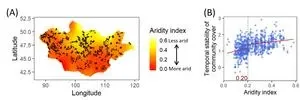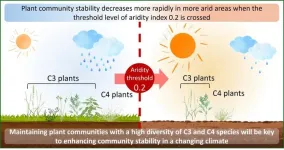(Press-News.org) New Curtin University-led research has identified 100-million-year-old fossilised bones discovered in western Queensland as belonging to a newly identified species of pterosaur, which was a formidable flying reptile that lived among the dinosaurs.
Unearthed in 2021 by Kronosaurus Korner museum curator Kevin Petersen, the fossilised remains have been found to belong to Haliskia peterseni, a new genus and species of anhanguerian pterosaur.
Based on the shape of its skull, arrangement of teeth and shape of the shoulder bone, a research team led by PhD student Adele Pentland, from Curtin’s School of Earth and Planetary Sciences, identified the specimen as an anhanguerian, which is a group of pterosaurs known to have lived across the world, including in what is now Brazil, England, Morocco, China, Spain and the United States.
“With a wingspan of approximately 4.6m, Haliskia would have been a fearsome predator around 100 million years ago when much of central western Queensland was underwater, covered by a vast inland sea and globally positioned about where Victoria’s southern coastline is today,” Ms Pentland said.
“Careful preparation by Mr Petersen has provided the remains of the most complete specimen of an anhanguerian, and of any pterosaur, discovered in Australia to date.
“Haliskia is 22 per cent complete, making it more than twice as complete as the only other known partial pterosaur skeleton found in Australia.
“The specimen includes complete lower jaws, the tip of the upper jaw, 43 teeth, vertebrae, ribs, bones from both wings and part of a leg. Also present are very thin and delicate throat bones, indicating a muscular tongue, which helped during feeding on fish and cephalopods.”
Haliskia peterseni joins several significant marine fossil specimens on display at Kronosaurus Korner, including Kronosaurus queenslandicus, the largest marine reptile with a skull at least 2.4m long, the most complete plesiosaur from Australia and bones from the plesiosaur Eromangasaurus and the ichthyosaur Platypterygius.
Mr Petersen said this latest discovery was an exciting boost for science, education and regional tourism.
“I’m thrilled that my discovery is a new species, as my passion lies in helping shape our modern knowledge of prehistoric species,” Mr Petersen said.
The full study titled ‘Haliskia peterseni, a new anhanguerian pterosaur from the late Early Cretaceous of Australia’ will be published in the journal Scientific Reports/Springer Nature (doi.org/10.1038/s41598-024-60889-8).
END
No bones about it: 100-million-year-old bones reveal new species of pterosaur
2024-06-12
ELSE PRESS RELEASES FROM THIS DATE:
City of Hope CAR T cell therapy for advanced prostate cancer demonstrates positive results in phase 1 clinical trial
2024-06-12
City of Hope CAR T cell therapy for advanced prostate cancer demonstrates positive results in phase 1 clinical trial
• Trial results published today in Nature Medicine
• A phase 1b trial using the same CAR T cell therapy has opened
LOS ANGELES — Treating prostate cancer with immunotherapy is currently difficult to do. But results from a first in-human phase 1 trial using a chimeric antigen receptor (CAR) T cell therapy developed by researchers from City of Hope®, ...
Exposure to heat and cold in early life may affect development of white matter in the brain
2024-06-12
Barcelona, 12 June 2024 (EMBARGOED) -. Brain scans of more than 2,000 preadolescents suggests that early life exposure to heat and cold may have lasting effects on the microstructure of white matter in the brain, especially when living in poorer neighbourhoods. The study, published in Nature Climate Change, highlights the vulnerability of foetuses and children to extreme temperatures. This research has been led by the Barcelona Institute for Global Health (ISGlobal), a centre supported by the “la Caixa” Foundation, and IDIBELL, in collaboration with the Erasmus University Medical Center Rotterdam ...
The role of biodiversity in mitigating rapid loss of plant community stability in drylands during changing climate
2024-06-12
An international research team undertook a study of plants in the Mongolian grasslands to evaluate the stability of these plant communities over time. They specifically looked at how the dryness of the climate impacted the plant communities and determined that the stability of the plant communities decreased more rapidly in more arid areas. This research helps in the development of effective management strategies that promote stable ecosystems in a time of changing climate.
The research is published in the journal Global Change Biology on June 12, 2024.
Scientists know that climate change affects the way biodiversity influences the stability of plant ...
Continuous vs intermittent β-lactam antibiotic infusions in critically ill patients with sepsis
2024-06-12
About The Study: The observed difference in 90-day mortality between continuous versus intermittent infusions of β-lactam antibiotics did not meet statistical significance in the primary analysis. However, the confidence interval around the effect estimate includes the possibility of both no important effect and a clinically important benefit in the use of continuous infusions in this group of patients.
Quote from corresponding author Joel M. Dulhunty, M.D., Ph.D.:
“The BLING III trial provides important evidence to guide antibiotic management and improve outcomes for patients with sepsis. This large randomized clinical trial involved over ...
Prolonged vs intermittent infusions of β-lactam antibiotics in adults with sepsis or septic shock
2024-06-12
About The Study: Among adults in the intensive care unit who had sepsis or septic shock, the use of prolonged β-lactam antibiotic infusions was associated with a reduced risk of 90-day mortality compared with intermittent infusions. The current evidence presents a high degree of certainty for clinicians to consider prolonged infusions as a standard of care in the management of sepsis and septic shock.
Corresponding Author: To contact the corresponding author, Jason A. Roberts, B.Pharm., Ph.D., email j.roberts@uq.edu.au.
To ...
Does inflammation in mid-life affect late-life mobility?
2024-06-12
In a recent study published in the Journal of the American Geriatric Society, having high inflammation in mid-life was associated with a clinically meaningful slower gait speed—an indicator of mobility—20 years later.
In the study, which included 4,758 community-dwelling adults, the link between high inflammation and slower late-life gait speed was especially strong for people with sustained high inflammation over the 20-plus years of follow-up. The association was evident even among the healthiest adults who never experienced other common conditions such as obesity, hypertension, ...
Does children’s sensitivity to their parents’ praise affect their future mental health?
2024-06-12
A new study published in Developmental Science found that children who were more positively sensitive to their parents’ praise when they were 3 years old had fewer behavioral and emotional problems when they were 5–7 years old. Children whose behavior did not depend on their mood also had fewer behavioral and emotional problems later.
For the study, which involved 60 children, parents sent in videos of their 3-year-olds brushing their teeth each night across 16 days. Toothbrushing time served as a measure of child behavior. Investigators also noted the amount of ...
How can artificial intelligence be applied to the business needs of the electric power industry?
2024-06-12
A recent study published in IET Generation, Transmission & Distribution explores how artificial intelligence—in particular machine learning techniques—can be leveraged as powerful tools for the electric power and energy industry, and for managing its assets.
By showcasing practical applications and success stories, the study demonstrates the growing acceptance of machine learning as a valuable technology for current and future business needs in the power sector. It also assesses the barriers and difficulties of implementing large-scale ...
Could a novel liver patch help treat and prevent liver disease?
2024-06-12
As described in research published in the Biotechnology Journal, investigators have developed a novel patch that can help liver tissue regenerate.
The patch is a combination of decellularized liver matrix, a liver growth factor, and an anticoagulant. In lab tests with liver cells, the patch helped liver cells regain function after exposure to a toxin.
In rats, patches attached to the liver and gut promoted recovery from liver fibrosis, with notable decreases in scarring and inflammation.
“The decellularized liver matrix–based hepatic patch has demonstrated the ability to ...
Do psychiatric conditions increase the risk of early death in individuals with anorexia nervosa?
2024-06-12
A new study published in the International Journal of Eating Disorders found that mortality rates are high in patients with anorexia nervosa and nearly double in the presence of psychiatric conditions.
For the study, investigators analyzed data on all individuals diagnosed with anorexia nervosa in Denmark in 1977-2018. This included 14,774 patients who were followed for a median time of 9.1 years (and up to 40 years) and were matched 1:10 with age- and sex-matched individuals in the general population.
Individuals with ...


